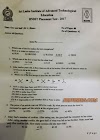Click on the tabs to see the Detailed Syllabus:
Module Details
| Module Code | HNDIT 1106 |
|---|---|
| Module Title | Web Development |
| Credits | 2 |
| Hours /Week |
Lectures - 15 Lab/Tutorial - 45 |
| Semester | 1 |
| GPA/NGPA | GPA |
| Module Type | Core Compulsory |
Module Aims & Objectives
To develop skills required for using Internet and software tools associated with the Internet
for information search, retrieval, and networking for improving productivity at work.
To develop skills and knowledge required for development and deployment of simple
websites with static content.
Learning Outcomes
At the end of the module the student will be able to:
▪ Describe the history and the development of the Internet.
▪ Describe operation and governance in the Internet.
▪ Connect a computer to the Internet using different connection options.
▪ Use common Internet based applications such as WWW, email, FTP etc.
▪ Describe and use emerging applications and social networking tools (Face Book, YouTube, Twitter etc.)
▪ Apply necessary security measures for transaction over the Internet.
▪ Develop and deploy web site using HTML.
▪ Describe the history and the development of the Internet.
▪ Describe operation and governance in the Internet.
▪ Connect a computer to the Internet using different connection options.
▪ Use common Internet based applications such as WWW, email, FTP etc.
▪ Describe and use emerging applications and social networking tools (Face Book, YouTube, Twitter etc.)
▪ Apply necessary security measures for transaction over the Internet.
▪ Develop and deploy web site using HTML.
Outline Syllabus
1. History and development of the Internet, How Internet operates and Internet
governance
2. Different ways of connecting to the Internet
3. Common Internet based applications (WWW, email, FTP etc.)
4. Types of web-sites (Static, Dynamic, Collaborative and Syndication etc.)
5. Migration from Web 1.0 to Web 2.0 and the differences between them
6. Modern Web applications (Social Networking, e-Commerce, e-Governance)
7. Data security issues in Internet (Viruses, Adware & Spyware, Trojan programs etc.)
8. Protecting data in the Internet
9. Mark up languages – HTML basics
10. Inserting images, links and Lists
11. Designing tables using HTML
12. Designing forms using HTML
13. Use of styles(CSS) and frames
14. Website development using a design tool
15. Deploying websites
2. Different ways of connecting to the Internet
3. Common Internet based applications (WWW, email, FTP etc.)
4. Types of web-sites (Static, Dynamic, Collaborative and Syndication etc.)
5. Migration from Web 1.0 to Web 2.0 and the differences between them
6. Modern Web applications (Social Networking, e-Commerce, e-Governance)
7. Data security issues in Internet (Viruses, Adware & Spyware, Trojan programs etc.)
8. Protecting data in the Internet
9. Mark up languages – HTML basics
10. Inserting images, links and Lists
11. Designing tables using HTML
12. Designing forms using HTML
13. Use of styles(CSS) and frames
14. Website development using a design tool
15. Deploying websites
Assessments
| Type | Activity | Weighting |
|---|---|---|
| Continuous Assessment | In class participation and quizzes | 20% |
| Design a web Site | 30% | |
| Semester Examination | Final Structured Paper | 50% |
Recommended Learning Activities
Classroom teaching and group discussions on theoretical aspects followed by hands-on
laboratorywork and assignments
Resources: Equipment, Tools and Materials
Computer laboratory facility with Internet access
Prescribed Books
Internet Resources:
[2]. Wikipedia page on the Internet - http://en.wikipedia.org/wiki/Internet
[3]. Wikipedia page on the History of the Internet - http://en.wikipedia.org/wiki/History_of_the_Internet
[4]. Wikipedia page on Web 2.0 - http://en.wikipedia.org/wiki/Web_2.0
[5]. W3 Schools web site





0 Comments